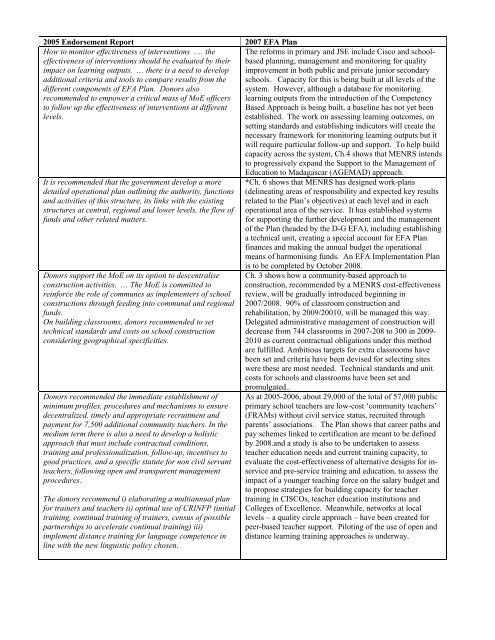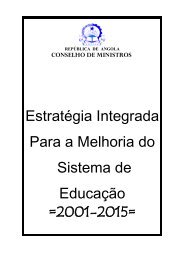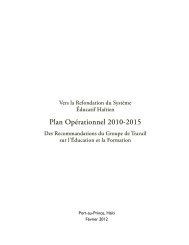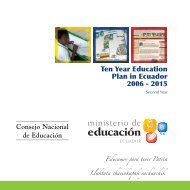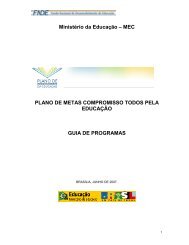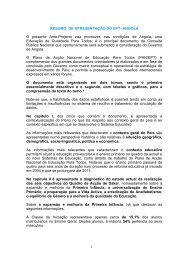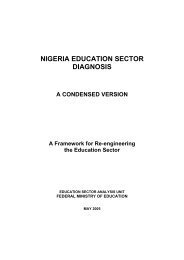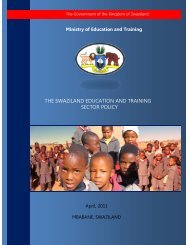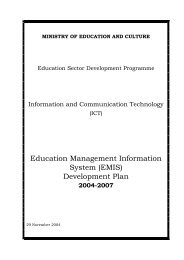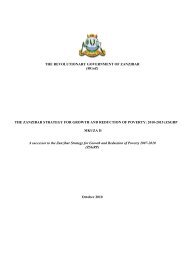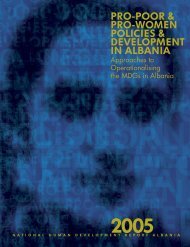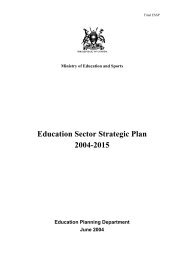Suite - Unesco
Suite - Unesco
Suite - Unesco
Create successful ePaper yourself
Turn your PDF publications into a flip-book with our unique Google optimized e-Paper software.
2005 Endorsement Report 2007 EFA Plan<br />
How to monitor effectiveness of interventions …. the<br />
effectiveness of interventions should be evaluated by their<br />
impact on learning outputs. … there is a need to develop<br />
additional criteria and tools to compare results from the<br />
different components of EFA Plan. Donors also<br />
recommended to empower a critical mass of MoE officers<br />
to follow up the effectiveness of interventions at different<br />
levels.<br />
It is recommended that the government develop a more<br />
detailed operational plan outlining the authority, functions<br />
and activities of this structure, its links with the existing<br />
structures at central, regional and lower levels, the flow of<br />
funds and other related matters.<br />
Donors support the MoE on its option to descentralise<br />
construction activities. … The MoE is committed to<br />
reinforce the role of communes as implementers of school<br />
constructions through feeding into communal and regional<br />
funds.<br />
On building classrooms, donors recommended to set<br />
technical standards and costs on school construction<br />
considering geographical specificities.<br />
Donors recommended the immediate establishment of<br />
minimum profiles, procedures and mechanisms to ensure<br />
decentralized, timely and appropriate recruitment and<br />
payment for 7,500 additional community teachers. In the<br />
medium term there is also a need to develop a holistic<br />
approach that must include contractual conditions,<br />
training and professionalization, follow-up, incentives to<br />
good practices, and a specific statute for non civil servant<br />
teachers, following open and transparent management<br />
procedures.<br />
The donors recommend i) elaborating a multiannual plan<br />
for trainers and teachers ii) optimal use of CRINFP (initial<br />
training, continual training of trainers, census of possible<br />
partnerships to accelerate continual training) iii)<br />
implement distance training for language competence in<br />
line with the new linguistic policy chosen.<br />
The reforms in primary and JSE include Cisco and schoolbased<br />
planning, management and monitoring for quality<br />
improvement in both public and private junior secondary<br />
schools. Capacity for this is being built at all levels of the<br />
system. However, although a database for monitoring<br />
learning outputs from the introduction of the Competency<br />
Based Approach is being built, a baseline has not yet been<br />
established. The work on assessing learning outcomes, on<br />
setting standards and establishing indicators will create the<br />
necessary framework for monitoring learning outputs but it<br />
will require particular follow-up and support. To help build<br />
capacity across the system, Ch.4 shows that MENRS intends<br />
to progressively expand the Support to the Management of<br />
Education to Madagascar (AGEMAD) approach.<br />
*Ch. 6 shows that MENRS has designed work-plans<br />
(delineating areas of responsibility and expected key results<br />
related to the Plan’s objectives) at each level and in each<br />
operational area of the service. It has established systems<br />
for supporting the further development and the management<br />
of the Plan (headed by the D-G EFA), including establishing<br />
a technical unit, creating a special account for EFA Plan<br />
finances and making the annual budget the operational<br />
means of harmonising funds. An EFA Implementation Plan<br />
is to be completed by October 2008.<br />
Ch. 3 shows how a community-based approach to<br />
construction, recommended by a MENRS cost-effectiveness<br />
review, will be gradually introduced beginning in<br />
2007/2008. 90% of classroom construction and<br />
rehabilitation, by 2009/20010, will be managed this way.<br />
Delegated administrative management of construction will<br />
decrease from 744 classrooms in 2007-208 to 300 in 2009-<br />
2010 as current contractual obligations under this method<br />
are fulfilled. Ambitious targets for extra classrooms have<br />
been set and criteria have been devised for selecting sites<br />
were these are most needed. Technical standards and unit<br />
costs for schools and classrooms have been set and<br />
promulgated..<br />
As at 2005-2006, about 29,000 of the total of 57,000 public<br />
primary school teachers are low-cost ‘community teachers’<br />
(FRAMs) without civil service status, recruited through<br />
parents’ associations. The Plan shows that career paths and<br />
pay schemes linked to certification are meant to be defined<br />
by 2008.and a study is also to be undertaken to assess<br />
teacher education needs and current training capacity, to<br />
evaluate the cost-effectiveness of alternative designs for inservice<br />
and pre-service training and education, to assess the<br />
impact of a younger teaching force on the salary budget and<br />
to propose strategies for building capacity for teacher<br />
training in CISCOs, teacher education institutions and<br />
Colleges of Excellence. Meanwhile, networks at local<br />
levels – a quality circle approach – have been created for<br />
peer-based teacher support. Piloting of the use of open and<br />
distance learning training approaches is underway.


